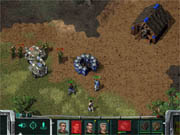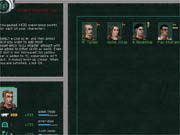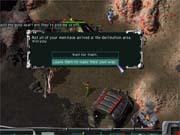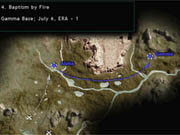It would be easy to write a review of Original War--one that used its tremendous misnomer of a title as the launching point for an urbane, New Yorker-esque critique of time travel and gorillas, which unfortunately is too often what passes for game criticism these days. It would be much harder--but still easy--to criticize the game's dated graphics, simplistic gameplay, incredibly bad voice acting, and nonsensical plot. In fact, criticizing any given element of Original War seems gratuitous, since taken separately, these elements are almost parodies of themselves. The game's plot is silly and further undermined by its atrocious sound, the gameplay makes Red Alert 2 seem like a complex strategy game, and the graphics can cause you to lead your units into a dead end that seems like a gully but is actually a cliff. Despite these nominal problems, you can actually find yourself getting caught up in the game. Not for long, mind you, but it can happen.

From all appearances, Original War is very similar to Fallout Tactics, except for the fact that it's really nothing like Fallout Tactics. While both games are played in real time, involve characters whose skills increase with experience, and make you fight through linked episodes of a really bad story as might be seen in comic books, Fallout Tactics plays at least nominally like a role-playing game. Original War, on the other hand, is almost in all respects a real-time strategy game from 1995.
The game's plot involves going back in time and mining some kind of future miracle substance in Siberia and then reburying it in Alaska so that the good guys control it when the time to discover its magical properties happens. Since mining simulations haven't exactly had much of an impact on gaming, a bunch of time-traveling Russians show up to make Original War a member of that much better-received genre of games, the simulation of blowing things up.
In one of those twists that game developers used to shock gamers back in 1990, Original War actually combines elements of several genres, to the extent that naming your units automatically makes something a role-playing game. These units can gain experience in four classes--soldier, mechanic, engineer, and scientist--and once they have been killed, they are lost forever. This leads to a lot of saving and reloading, since units die very quickly.

Characters actually possess levels in each of these specializations, and you can switch between specializations at various times by entering a specific building that functions as a sort of changing room. Apparently, Original War's designers figured that if they couldn't make something original, they could at least make it incredibly cumbersome so that players feel like they're accomplishing something: only mechanics can drive vehicles, only soldiers can fire weapons, only scientists can heal, and only engineers can construct buildings and collect supplies. Thus, even if one of your characters has a high skill in some area, if he hasn't been specifically designated as a certain class, he cannot perform that class' functions. This leads to such contrivances as the need to construct an armory at the end of each mission, in which you didn't otherwise need one, simply to change all your characters into soldiers so that they can actually fight.
Original War's graphics and sound aren't just bad, but they're also confusing. The game's voice acting is bad in two ways: first, it's just plain bad, and second, many of the unit acknowledgements don't actually match the voices that particular character uses in dialogue. Furthermore, the cartoon heads that appear when a character speaks compare unfavorably, from an aesthetic standpoint, to portraits in role-playing games circa 1993. The rest of the game's graphics have the hand-painted look of Baldur's Gate, which not only places them squarely in 1998 but also makes them very confusing to navigate. While the game supposedly takes place in the Pliocene Epoch, it doesn't feel much different from any other computer game setting, except for the occasional saber-toothed tiger or apeman.
The single-player game can be started as either the Americans or the Russians, but the full campaign (and story) consists of playing through the American missions and then the Russian ones. While the story is mostly linear, there are branching points where you can make decisions that determine the progress of the plot. Unfortunately, these decisions are mixed in with ones that simply lead you to have to restart the mission, because they are dead ends. There is actually a third side (the Arabs) that enters the plot, but the action takes place mainly between the Russians and Americans.

Original War's actual gameplay greatly resembles a fidgety version of Command & Conquer. While real-time strategy games have generally advanced far beyond 1995, Original War has actually regressed. Units are hard to control and tend to wander around even when they have no orders (which often leads them to get killed by the enemy you were specifically trying to stay away from). There is a "stand ground" order, but it is canceled as soon as you move the unit. The game's pathfinding and general unit AI are awful--they destroy any kind of atmosphere the game tries to create with details like realistic vehicle movements. Sometimes a vehicle will even expose itself to enemy fire because it has to drive in reverse to get around an obstacle you left it parked against. Aside from the role-playing elements and the fact that you cannot replace human soldiers, the production and research aspects of the game are straightforward and similar to those in most other real-time strategy games. If you have the right tech, you can build a vehicle, and its armament and power plant are further functions of your technology. While Original War is ostensibly a tactical combat game, the tactical options are in fact laughably limited. For instance, only soldiers can crawl, and standing and crawling are the only two positions in the game.
The other thing that leads to a lot of saving and reloading is the fact that Original War is essentially a puzzle game: There are certain "best" ways to finish a scenario, and that's that. Each mission has multiple objectives, although you aren't given all of them right away, and you occasionally make choices as to which objectives you will fulfill. The missions are heavily scripted as a result, since there are a lot of sequential actions that advance the plot. This "connect the dots" approach manages to keep the missions moving, since if the gameplay were left to carry them along, Original War would be nothing more than a weak RTS with named characters and abilities and no innovation whatsoever. The most attractive part of the game, in fact, is the cutscenes, which are nicely done (visually, anyway) for both the American and Russian campaigns.

Despite the fact that this review now practically reads as an encyclopedia of why you shouldn't buy a game like this, Original War does have some appeal, albeit mostly for veteran gamers. This is because every lame trick they've learned while playing real-time strategy games as the genre has evolved comes into play here--standing units just out of visual range of an enemy turret until you get a force together to rush it, concentrating all your firepower on one enemy at a time while your scientist heals your soldiers (and while you hit the pause key every half second), or timing the AI patterns so that you can sneak your units past a strongpoint. It's all there. Since the simple gameplay should make the learning curve nonexistent for experienced players, playing through Original War is like redefeating all those games you've beaten over the past 10 years.
Original War is a game that you will have no desire whatsoever to play in your free time, but as soon as you have something important to do, it will become the most interesting thing imaginable. This is due almost solely to the game's pacing, which gives you new things to do at almost the exact point when you're ready to give up on how pointless and frustrating it is. While it gets tripped up (and eventually falls flat on its face) before getting very far due to its numerous crippling problems, it actually turns out to be somewhat better than you might have thought it would be. That last sentence, and the fact that the game is budget-priced, are the two best things that can be said about it.